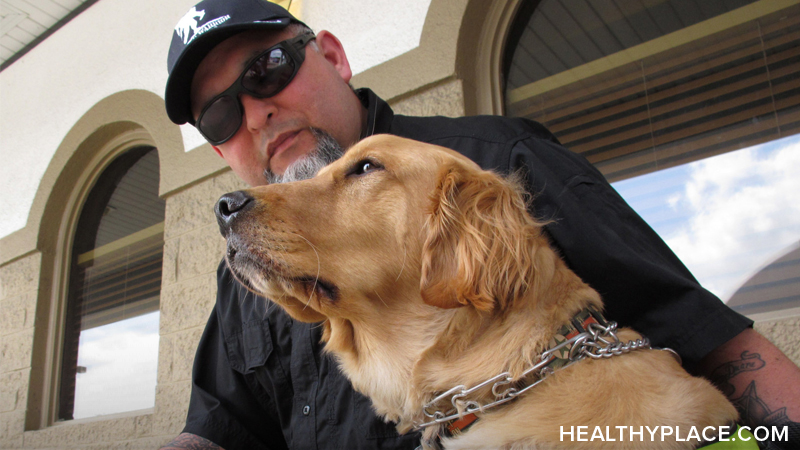PTSD Service Dogs: How They Help and Where to Find Them

Posttraumatic stress disorder (PTSD) service dogs are now being trained in specialized programs and facilities across the United States and in other countries. PTSD service dogs are trained to help someone with PTSD through emotional support and through completing tasks for the person with PTSD (PTSD service dogs are not meant to be a person's sole form of PTSD help or support). There is a difference between a service dog for PTSD and an emotional therapy dog for PTSD. Service dogs are typically granted special permissions (such as entering places where a dog would not typically be allowed) whereas emotional therapy dogs for PTSD may not be.
What Is a PTSD Service Dog?
Service dogs for PTSD are highly trained to fit an owner’s needs. In order to be considered a service dog, a dog must typically:
- Do things that are different from natural dog behavior
- Do things that the dog owner cannot do because of a disability
- Learn to work with the owner in ways that help manage the owner’s disability
Because of this definition, people with PTSD typically do not qualify to receive certified service dogs through assistance programs unless they also have another disability with which the dog can assist (such as blindness, seizures or diabetes). This does not mean that dogs cannot be specially trained for those with PTSD, however, and some do find these dogs beneficial.
According to Canines 4 Hope, an organization that trains services dogs for PTSD, such dogs can:
- Assist in a medical crisis
- Provide treatment-related assistance
- Assist in coping and emotional overload
- Perform security enhancement tasks
What Is a PTSD Emotional Therapy Dog?
For people with PTSD, dogs are typically considered emotional support animals. These animals may be very important in a person’s life but just may not qualify for the “service dog” label. Emotional therapy animals help people with mental illnesses, such as PTSD, by providing companionship and friendship. Emotional support dogs do not require specialized training.
Owning a dog, including an emotional support dog, can:
- Help bring out feelings of love
- Be a good companion
- Take orders when well trained
- Be fun and help reduce stress
- Be a good reason to get out of the house, spend time outdoors and meet new people
All of the above could be useful to a person with PTSD.
How to Get a Trained PTSD Service Dog
Some organizations do offer PTSD service dog training; however, it can be prohibitively expensive, for most, to obtain a dog from one of these facilities. For example, the organization Service Dogs for America trains PTSD service dogs and has a long list of eligibility requirements including the facts that:
- A service dog costs $20,000 (some of which may be supported by available grants).
- The yearly cost of owning a service dog is $2,500.
To find a reputable organization that trains service dogs, you may wish to start by checking out the North American directory of Assistance Dog International. People with PTSD can use many other types of PTSD therapy to heal, so don't give up if a PTSD service dog is cost-prohibitive or unavailable.
APA Reference
Tracy, N.
(2021, December 26). PTSD Service Dogs: How They Help and Where to Find Them, HealthyPlace. Retrieved
on 2026, January 30 from https://www.healthyplace.com/ptsd-and-stress-disorders/ptsd/ptsd-service-dogs-how-they-help-and-where-to-find-them



